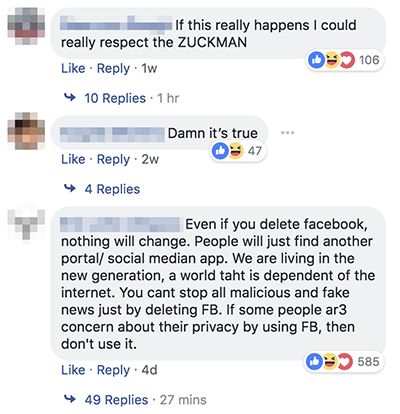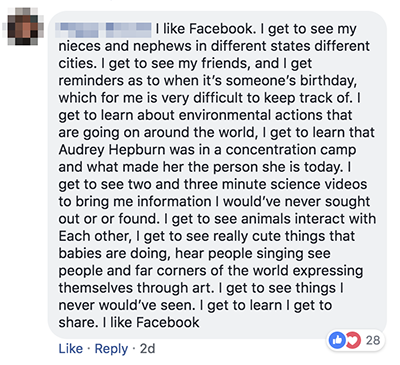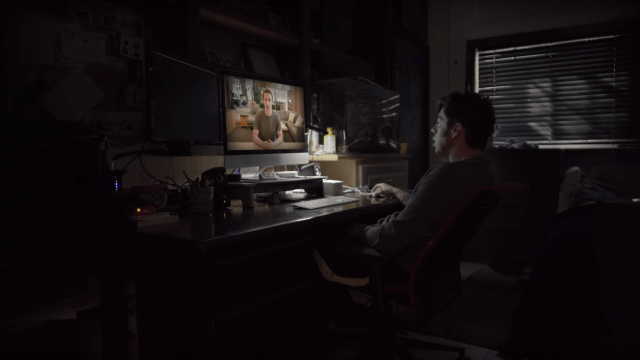A couple years ago, Andrew Oleck wondered if he could make a viral video. The Los Angeles-based filmmaker had been freelancing and doing commercial work for a decade and wanted to branch out. It took a while, but on April 1, he released his first attempt at internet stardom: a three-minute satire, where Mark Zuckerberg says he’s decided to delete Facebook. The video has now been viewed over 32 million times. But the truly remarkable thing is how many people apparently think it’s real.
It’s sort of perfect, actually. “A World Without Facebook” is a fake video of Mark Zuckerberg discussing how fake news helped convince him to delete Facebook in its entirety, and it sparked collective outrage on Facebook, where users believe it’s a real announcement from the company’s founder. The clues that the video’s a fake appear within the first second:
Look at Zuckerberg’s too-large lips, moving in an unnatural fashion. (Those are actually Oleck’s lips added to Zuckerberg’s head using a software trick in After Effects.) Listen to his voice, which sounds lower and slightly less drone-like than usual. (That’s Oleck’s voice.) On a more nuanced level, it’s strange that the video of Zuckerberg speaking in an office appears to be shot at a much lower resolution than the video of the people watching the video. (The original video is actually Zuckerberg talking about Russian election interference late last year.) If you weren’t thrown by any of those clues, though, the end of the video clearly states, “This video is satire.” Of course, it was. The video is clearly dated April 1.
“I wanted to make a universally understandable video that people would watch and go for the ride,” Oleck told Gizmodo in an interview. “I just thought it was something that hadn’t been done before. And in an alternate reality, it would be really cool if Zuck thought his creation was out of control, and he had to put a stop to it.”
Oleck’s video wasn’t an immediate viral hit. A few days after publishing the video and after spending a small sum on targeted ads to boost its reach, Oleck says the video had only garnered about 100,000 views. Then, on April 10 and 11, Zuckerberg began two days of testimony on Capitol Hill to defend his company in the wake of the Cambridge Analytica scandal. So Oleck decided to pay for another boost, just to see what happened. The video exploded.
At the time of writing, “A World Without Facebook” had reached over 15 million people, and it had been viewed over 32 million times. The Facebook post itself had been clicked over 42 million times. These are big numbers. However, what’s especially interesting are the 60,000-plus comments, many of which express dismay and sadness that Zuckerberg is about to delete Facebook. People really believe the fake video is real.
Just have a look at some of the top comments on the video. (We’ve blurred names and profile pictures to respect the users’ privacy.)

Others sounded more sentimental about the death of Facebook:

For the sake of accuracy, it’s worth pointing out that Audrey Hepburn was never in a concentration camp. During World War II, the actress did live in Arnhem, a city in the eastern Netherlands that was occupied by the Nazis.
It’s not news that people see things on Facebook that are not true. Aside from the flagrant and repeated violation of users’ privacy, the fake news epidemic might be the most controversial aspect of Facebook right now, and the company is struggling to come up with a solution. In this light, Oleck’s video actually seems like a good case study to better understand the phenomenon. It wasn’t just the paid-for boost that caused “A World Without Facebook” to go viral, the filmmaker says. Oleck saw a massive uptick in traffic to the video when another Facebook user reposted the video with a chain-letter style description that claimed to be authored by Mark Zuckerberg himself. Here’s a snippet from that post:
Hi, I’m Mark Zuckerberg The Director of facebook.
Hello everyone, it seems that all the warnings were real, facebook use will cost money
If you send this string to 18 different from your list, your icon will be blue and it will be free for you.
If you do not believe me tomorrow at 6 pm that facebook will be closed and to open it you will have to pay, this is all by law. …
You can imagine what some desperate Facebook users might do upon seeing this. After all, Zuckerberg himself suggested in his testimony on Capitol Hill that a paid version of Facebook might exist in the future. The chain-letter model actually bolsters the truthiness of the claim since Facebook users are more directly telling their friends that Zuckerberg will delete Facebook if they don’t share this video — which is completely fake — with many of their friends.
Oleck didn’t mean for this to happen when he created his satirical video. Sure, he wanted people to think about what the world would be like if Facebook went away. But he didn’t expect people to believe that Zuckerberg was actually deleting Facebook.
“I wanted everybody to see it, but internationally they see snippets of Mark Zuckerberg’s face on CNN and wonder why Zuckerberg is talking to Congress,” Oleck explained. “Then this video came out and people just took it for truth or an actual statement from Zuckerberg.”
As janky as “A World Without Facebook” looks to the informed user, it presumably looks very real to those who view stories in the News Feed as true news stories. The likelihood of video-based deception will only get worse, too, as technology is advancing toward a point where the right software can make realistic videos of people saying anything they want. Just look at these fake videos of Barack Obama saying things he never actually said.
And even those who might doubt what they see on Facebook, they stand to be encouraged by the fact that it’s their friends who are sharing their information. Why would their friends share fake news?
We’re left with a very confusing world. Facebook is not going away anytime soon. And it’s probably just going to get easier to spread misinformation. There are good actors, like Oleck, who make satirical content with the hope of shining a light on real problems. There are bad actors, like Russian operatives, who want to weaponize Facebook for political gain. How can you avoid taking part in this dark, twisted 21st-century dance?
You guessed it: delete Facebook.
